Introduction to Natural Food
Natural foods do not go through further process and have no additive or artificial ingredients.. Preservatives, colors and flavors added Type of food. Such food products are obtained directly from plants and animals, that is, they They undergo significant changes and retain their nutrients, texture and flavor. Such products include cereals, fruits, vegetables, milk, eggs and meat. These foods also include grains.
What Are Natural Foods?
Generally, Natural food is food obtained from nature which has passed through very low processing. The food obtained from nature that does not have any adulteration, mentor, artificial color or taste is considered natural. This is the food that is closest to its original form determined by nature.
Examples of Natural Foods
- Fruits and vegetables
- Nuts and seeds
- Whole grains (e.g., brown rice, oats, quinoa)
- Fresh meat, poultry, and fish
- Milk, eggs, and honey (unprocessed or minimally processed)
What Natural Food is NOT
- Sugary soft drinks
- Artificially flavored snacks
- Instant noodles with flavor packets
- Ultra-processed fast foods
Note: The term “natural” isn’t strictly regulated in many countries. Companies often use it loosely for marketing. Always check the ingredient list to know how natural something really is.
Difference Between Natural and Organic

Natural food refers to minimal processing, while organic food refers to how the food is grown—without synthetic pesticides or GMOs. Organic is a certification; natural is not.
| Feature |
Natural Food |
Organic Food |
Processed Food |
| Definition |
Minimally processed, no artificial additives |
Grown without artificial chemicals, certified organic |
contains highly modified, synthetic compilers |
| Farming Method |
May use chemicals during farming |
No synthetic pesticides, fertilizers, or GMOs |
Uses industrial methods, chemicals, preservatives |
| Additives |
Usually none or minimal |
None allowed |
Contains preservatives, colors, flavors |
| Health Impact |
Healthier than processed, but not chemical-free |
Healthiest option, eco-friendly |
Often unhealthy, linked to lifestyle diseases |
| Examples |
Fresh fruits, milk, eggs, unprocessed grains |
Organic fruits, vegetables, organic dairy products |
Packaged snacks, sodas, instant noodles |
Why Choose Natural Food?

Choosing natural food forces to choose less processed, chemical-free and more organic options. Natural foods are better than the following main reasons
Nutritional Value
Some vitamins, minerals and antioxidants that are important for your health, then foods can be lost when it is very processed.
Better for Health
With low chemicals and additives, natural foods reduce the risk of lifestyle related diseases and support overall health.
Improved Digestion
Natural foods often contain fiber and nutrients that help digestion and maintain the health of the intestine.
Mental Well-being
Eating close to nature can promote mood and energy levels, can contribute to overall mental welfare.
Benefits of Natural Food: Nutritional Value

Essential Nutrients
Natural foods in its entire form are rich in vitamins, minerals, antioxidants and fiber. Since they undergo minimal processing, they maintain the original nutrients that are often lost in processed foods.
High in Dietary Fiber
Fruits, vegetables, whole grains and nuts provide adequate amounts of dietary fiber that combines digestion, maintains healthy cholesterol levels and helps to control blood sugar.
Better Antioxidant Content
Natural foods contain antioxidants such as vitamin C, vitamin E and phytochemicals, which help the body protect from oxidative stress and reduce the risk of chronic diseases.
Balanced Micronutrients
Natural foods provide balanced supply of carbohydrates, proteins and healthy fats. Preferably, they do not include added sugars, trans fats or artificial preservatives. They regulate metabolism and energy levels.
Improved Bioavailability
Nutrients in natural foods are more bio -movable, which means that the body can absorb and use them more efficiently than nutrients in processed or synthetic supplements.
No Hidden Chemicals
Free from artificial additives and preservatives, natural foods reduce the intake of harmful chemicals that disrupt physical functions and increase inflammation.
Improved Digestion & Immunity Through Natural Food

Supports Healthy Digestion
Natural foods, especially fruits, vegetables, whole grains and legumes, are rich in dietary fiber. This fiber helps regulate intestinal movements, prevents constipation, and promotes a healthy intestine microbiom by nourishing beneficial bacteria.
Nutrient Increases Absorption
Because natural foods contain enzymes and nutrients, which are in their untouched form, they help in the digestive process of the body, which improves the absorption of essential vitamins and minerals.
Increases Immune System
Natural foods provide important antioxidants, vitamins (such as vitamin C, D, and E), and minerals such as zinc and selenium that strengthen the immune system. These nutrients help the body fight infection and reduce inflammation.
Reduces Inflammation
Many natural foods have anti -inflammatory properties that can reduce chronic inflammation, a common cause of many diseases including autoimmune disorders and allergies.
Intestine Promotes Health
In natural foods, prebiotic fiber feeds beneficial intestine bacteria, which play an important role in immunity, protecting the body from harmful pathogens.
Mental and Physical welfare with Natural Food

Better Mental Health
Natural foods, B-complexes and magnesium-rich in minerals such as vitamins, help to regulate brain functions and neurotransmitters. It reduces stress, anxiety and depression while improving attention and mood.
Stable Energy Levels
Complete, disappointed foods provide complex carbohydrates and healthy fats that slowly leave the energy, suddenly the sugar spikes and the crash. It keeps you active and cautious throughout the day
Better Sleep Quality
Nutrients such as magnesium found in leafy greens and nuts promote relaxation and improve sleep quality, which is important for mental health and recovery.
The Risk Of Lifestyle Diseases Decreased
Eating natural foods helps to maintain healthy weight and reduces the chances of diabetes, heart disease and obesity, which contributes directly to physical welfare.
Enhanced Brain Function & Memory
The omega-3 fatty acids present in natural foods such as nuts and seeds improve cognitive functions and memory, which can prevent age-related decline.
Stress Reduction
Natural foods are deficient in artificial stimulating and harmful chemicals that can put pressure on the nervous system. Their nutrient -rich profiles support the overall emotional balance.
Types of Natural Foods: Fruits and Vegetables

Fruit
Fruits are naturally sweet, nutrient-dense, and rich in vitamins ...
Example:
- System Fruit: Orange, Lemon, Lemon
- Jamun: Strawberry, Blueberry
- Tropical Fruit: Mango, Papaya
Health Facilities:
- Promote immunity
- Improve heart health
Vegetables
Vegetables are low in calories but are high in essential nutrients ...
Example:
- Leafy Greens: Spinach, Kel, Latus
- Root Vegetables: Carrot, Beat
Health Facilities:
- Promote digestion
- Inflammation
Whole Grains

Whole grains are grains that have all the three parts of the kernel - bran, germs, and endosperm - make them rich in fiber, vitamins, minerals and healthy carbohydrates. Unlike sophisticated grains, whole grains are processed minimally, so they maintain their natural nutrients.
Examples
- Brown Rice
- Oats
- Quinoa
- Barley
- Millet (Ragi, Jowar, Bajra)
- Whole Wheat
Health Benefits:
-
Excessive fiber: improves digestion and prevents constipation
-
Heart Health: Helps reduce cholesterol and supports healthy blood pressure
-
Energy Source: Provides complex carbohydrates for long -term energy
-
Weight Management: Keeps you full -time, reduces overeating
-
Diabetes Control: Helps control blood sugar levels
Nuts and Seeds

Nutritional-dining natural foods that provide healthy fats, protein, fiber, vitamins and minerals. They are excellent sources of energy and essential fatty acids, which are important for heart health and brain function.
Examples of Nuts:
- Almonds
- Walnuts
- Cashews
- Pistachios
- Hazelnuts
Examples of Seeds:
- Chia Seeds
- Flaxseeds
- Sunflower Seeds
- Pumpkin Seeds
- Sesame Seeds
Health Benefits:
- Is rich in healthy fats: Omega -3 and omega -6 fatty acids support heart and brain health
- Excessive protein: Helps muscle repair and growth
- Fiber-Rich: Improves digestion and supports weight management
- Antioxidant Power: Reduces inflammation and prevents cell damage
- Increases energy: Ideal for quick, healthy snack
Legumes and Pulses

Chikkas and pulses are the main source of plant -based protein, dietary fiber, vitamins and minerals. They are low in fat, non -cholesterol and provide nutrients for energy and muscle health. These foods are very important for vegetarians and vegetarians.
Examples:
-
Lentils (Masoor dal)
-
Chickpeas (Chana)
-
Kidney Beans (Rajma)
-
Black Beans
-
Green Gram (Moong dal)
-
Peas
Health Benefits:
- Excellent Protein Source: Suitable for muscle repair and growth.
- Fiber Rich: AIDS maintains digestion and bowel health.
- Supports Heart Health: Helps to reduce cholesterol and blood pressure.
- Controls Blood Sugar: Low glycemic index, beneficial for diabetes.
- Weight Management: Reduce desires and keeps you full of long.
Natural Dairy

Natural dairy products come from synthetic hormones, antibiotics or grown animals without artificial additives. These products are processed to retain natural nutrients such as calcium, protein and vitamins.
Examples:
- Whole milk (preferably from grass-fed cows)
- Yogurt (plain, sweet)
- Cheese (natural types such as paneer, old age cheese)
- Butter (from natural cream, no additives)
Health Benefits:
- Rich in Calcium & Vitamin D: Supports strong bones and teeth
- Good Source of Protein: Aids muscle growth and repair
- Contains Probiotics (in yogurt): Promotes gut health and immunity
- Healthy Fats: Provide energy and help absorb fat-soluble vitamins
Natural Meats
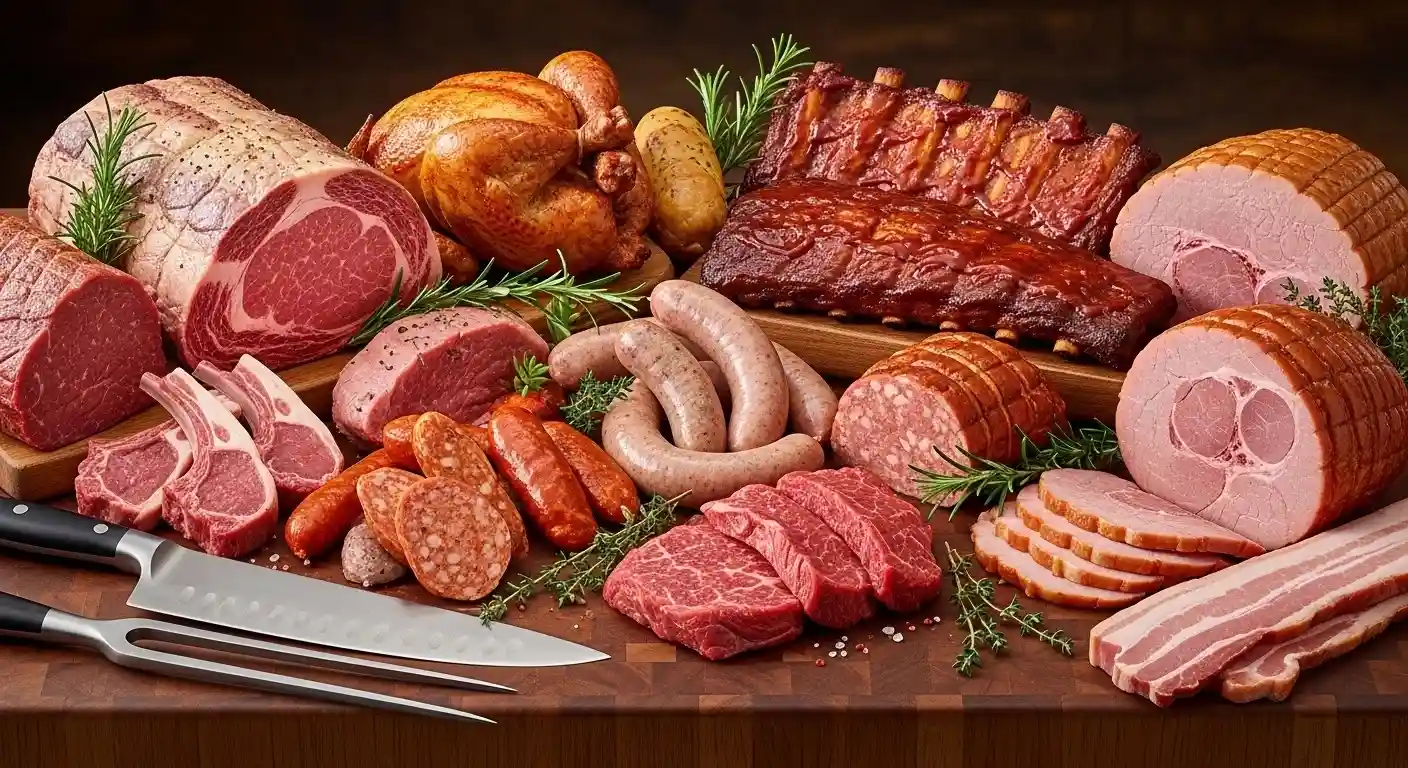
Natural meats come from growth hormones, antibiotics or genetically modified feed. They are less processed, often grass-fed or free-range, good nutritional quality..
Examples:
- Grass-fed beef
- Free-range chicken
- The fish holding the wild
- Lamb and goat meat from natural farming
Health Benefits:
- High-Quality Protein: Essential for tissue repair and muscle building
- Rich in Vitamins & Minerals: Especially B vitamins, iron, and zinc
- Lower in Harmful Additives: Free from preservatives and synthetic chemicals
- Better Fat Profile: Higher omega-3 fatty acids in grass-fed and wild meats
Natural vs Processed Foods

| Aspect |
Natural Foods |
Processed Foods |
| Definition |
Changed to a minimum, free from synthetic additives |
Highly modified with preservatives, flavors, colors |
| Nutritional Value |
Contains natural vitamins, minerals and fiber |
Nutrients are often removed during processing |
| Health Impact |
Supports digestion, immunity and energy |
OB is connected with dynamics, diabetes and heart disease |
| Examples |
Fresh fruits, vegetables, nuts, whole grains |
Packaged snacks, instant noodles, sugary drinks |
🚫 Why Processed Foods Can Be Harmful
🍬
Too much sugar: Leads to weight gain, increases diabetes risk, and leaves us feeling tired quickly.
🥓
Unhealthy fats: Trans fats and processed oils can block arteries and harm heart health.
🧂
Excess salt: Too much sodium raises blood pressure and puts stress on the kidneys.
🧪
Additives & preservatives: Some may trigger allergies or cause long-term health concerns.
➖
Poor nutrition: Often high in calories but low in vitamins, minerals, and fiber.
☣️
Chemical residues: May contain traces of pesticides or harmful chemicals from processing.
How Natural Foods Help in Weight Management
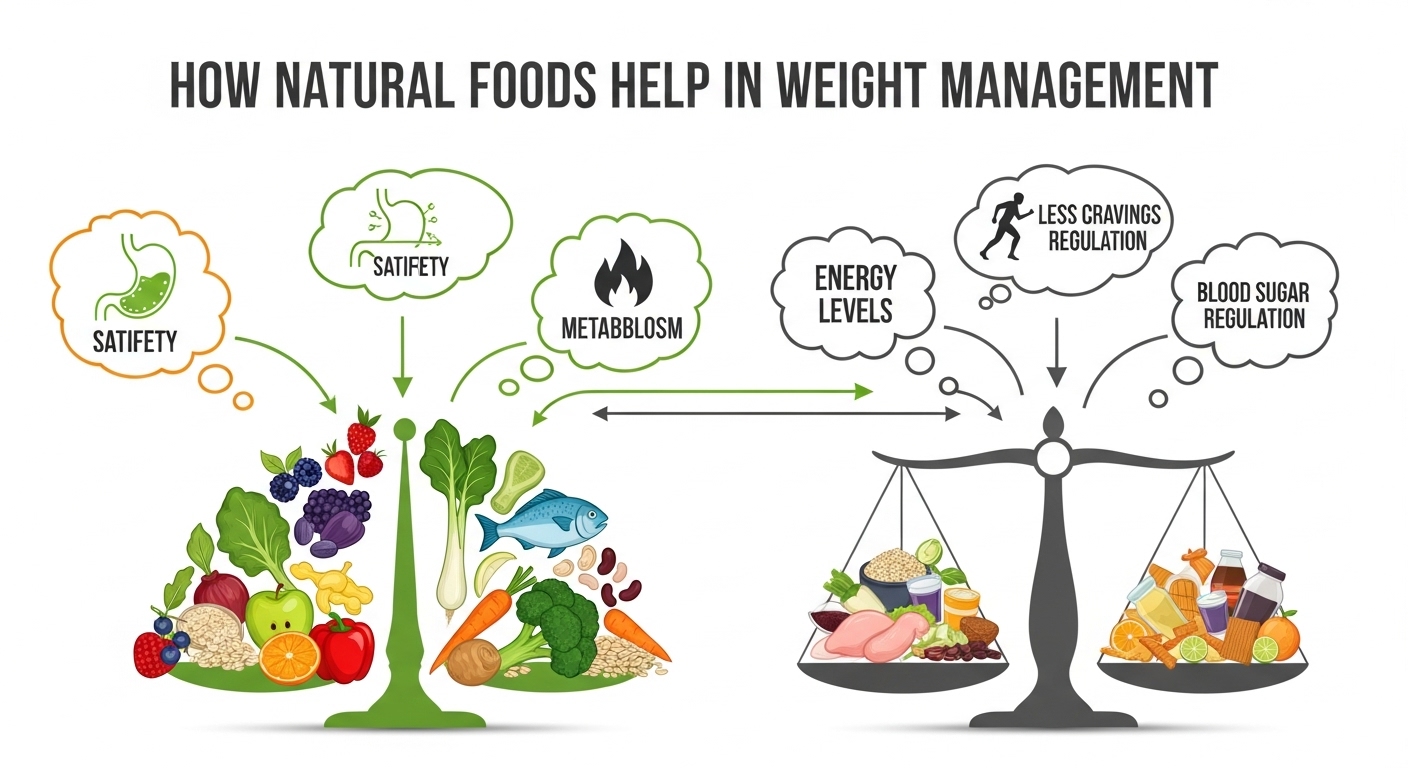
Natural foods are minimally processed and nutrient-dattled, which are ideal for maintaining healthy weight. They provide vitamins, minerals, fiber and healthy fat without artificial additives found in high calories, refined sugars and processed foods.
Key Benefits for Weight Management
- Rich in Fiber: Makes you feel full which prevents overeating.
- Low empty calories: reduce the risk of excess sugars and bad fats
- Good for satisfaction: Proteins keep your blood sugar stable and tide insatiable hunger
- Boosts metabolism: Ginger and cinnamon are known to increase calorie burning.
Best Natural Foods for Weight Management
Fruits & Vegetables
Berries, apples, citrus fruits, spinach, broccoli.
Whole Grains
Brown rice, quinoa, oats – carbs that take a while to digest.
Lean Proteins
Eggs, beans, lentils, tofu and fish for muscle building.
Healthy Fats
Nuts, seeds, avocados, olive oil for satiety.
Natural Drinks
Green tea, lemon water increase metabolism.
Natural Eating Habits for Weight Management
- Eat Mindfully – chew slowly, avoid distractions.
- Portion Control – even healthy foods need balance.
- Stay Hydrated – water reduces hunger pangs.
- Avoid processed sauces and sugary drinks.
- Plan meals with seasonal natural foods.
Sample Natural Weight-Management Snacks
- Apple slices with almond butter
- Carrot & cucumber sticks with hummus
- Mixed nuts and seeds (small handful)
- Greek yogurt with fresh berries
Why Natural Foods Matter
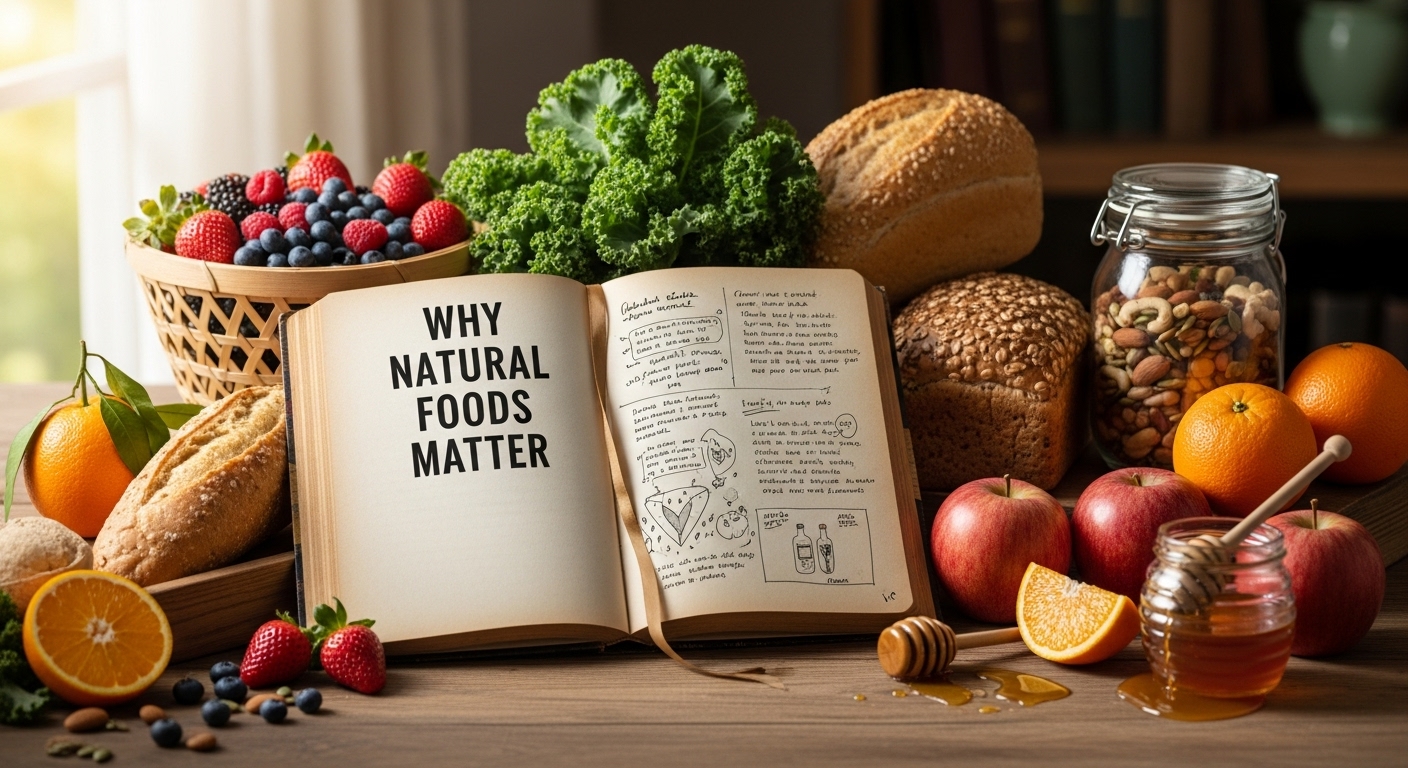
Diabetics and, or hypertensive individuals may feel great relief as natural foods stabilize blood sugar, strengthen the heart and may lessen the need for medications. These are the type of foods that are high in fiber, antioxidants and certain vitamins and minerals, while being low in saturated fats, sodium and added sugar. And adding whole grains, fresh fruits, leafy greens, beans and legumes and nuts can keep those energy levels and weight in check while making us feel good overall.
Natural Foods for Diabetes Control
Whole Grains
Oats, brown rice, quinoa, barley. It is low GI, which means it prevents a spike of sugar.
Leafy Greens
Spinach, kale, fenugreek — it’s fiber-rich and low in carbs.
Legumes & Pulses
Lentils, chickpeas, beans — loads of protein and fiber.
Fruits (Low GI)
Apples, berries, guava (eat whole, not as juice).
Healthy Fats
Nuts, seeds, avocado—improve insulin sensitivity.
Spices
Cinnamon & methi dana control blood sugar.
Natural Foods for Blood Pressure Control
Leafy Greens:Rich in potassium, balance sodium.
Beetroot: Nitrates relax blood vessels.
Bananas: Potassium and supports heart health. .
Garlic: Naturally reduces blood pressure.
Berries: Antioxidants improve vessel health.
Oats & Dairy: High fiber and calcium, which help control blood pressure.
Natural Lifestyle Tips
-
Reduce salt intake; use herbs/spices for flavor.
-
Maintain portion control, even with healthy foods.
-
Stay hydrated; avoid sugary drinks.
-
Regular physical activity helps control sugar and blood pressure.
-
Manage stress with yoga, meditation, or breathing exercises.
Sample Natural Snack Ideas
- A handful of unsalted nuts.
- Cucumber & carrot sticks with hummus.
- Greek yogurt with berries.
- Roasted chickpeas.
Diabetes and Blood Pressure Control with Natural Foods

Managing diabetes and hypertension requires balanced nutrition. Natural foods are the best option because they:
- Stabilize blood sugar (low glycemic index)
- Lower blood pressure naturally
- Provide fiber, minerals, and antioxidants
- Avoid artificial additives and refined sugars
Natural Foods for Diabetes Control
Whole Grains
Brown rice, quinoa, oats, barley. Low GI foods reduce blood sugar spikes.
Green Leafy Vegetables
Spinach, kale, methi leaves. They are low in carbs and rich in fiber and magnesium.
Legumes & Pulses
Lentils, chickpeas, beans. High in protein and fiber for slow glucose release.
Low GI Fruits
Apples, berries, pears, guava. Avoid processed fruit juices.
Nuts & Seeds
Almonds, walnuts, chia, flaxseeds. They improve insulin sensitivity.
Natural Spices
Cinnamon helps regulate blood sugar. Fenugreek seeds lower glucose levels.
Natural Foods for Blood Pressure Control
Leafy Greens: rich in potassium, include spinach, kale, and beet .
Beetroot: Beetroot contains nitrates that help relax blood.
Bananas: High in potassium and support heart.
Garlic: helps lower blood pressure and cholesterol naturally.
Berries: Antioxidants help blood vessel function.
Whole Grains:Oats and barley lower blood pressure by providing fiber.
Lifestyle Tips
- Reduce salt: Use herbs/spices for flavor.
- Avoid refined sugar: Use stevia, honey in moderation.
- Stay hydrated: Drink water, herbal teas.
- Exercise daily: Even 30 minutes of walking.
- Manage stress: Yoga, meditation, deep breathing.
Sample Natural Snack Options
- Unsalted nuts or seeds.
- Veggie sticks with hummus.
- Fresh fruit with cinnamon sprinkle.
- Roasted chickpeas.
Gut Health and Skin Glow with Natural Foods

✅ Why Gut Health Matters for Skin: Your gut and skin are connected through the gut-skin axis. A healthy gut improves digestion, nutrient absorption, and immunity, which reflects as clear, glowing skin. Poor gut health can lead to acne, dullness, and inflammation.
Best Natural Foods for Gut Health
Probiotic-Rich Foods
Yogurt, kefir, kimchi, sauerkraut, kombucha – promote good gut bacteria.
Prebiotic Foods
Garlic, onions, leeks, asparagus, bananas – feed healthy gut microbes.
High-Fiber Foods
Whole grains, legumes, fruits & vegetables – aid digestion and reduce bloating.
Fermented Foods
Miso, tempeh, traditional pickles – support microbiome diversity.
Hydration
Plenty of water and herbal teas like ginger & peppermint.
Natural Foods for Glowing Skin
Vitamin C Fruits: Oranges, berries, guava, kiwi – boost collagen & fight free radicals.
Healthy Fats: Avocado, nuts, seeds, olive oil – keep skin hydrated.
Antioxidant Foods: Green tea, dark chocolate, berries – reduce skin aging.
Protein Sources: Lentils, beans, eggs, fish – support skin repair.
Hydrating Foods: Cucumbers, watermelon, celery – maintain skin moisture.
Lifestyle Tips
- Avoid processed foods – they disrupt gut health & cause breakouts.
- Limit sugar & dairy if sensitive – prevents inflammation.
- Manage stress: Practice yoga, meditation.
- Sleep well for cell repair & hormonal balance.
Sample Gut & Skin-Friendly Meal Plan
- Breakfast: Oatmeal with berries and chia seeds.
- Snack: Yogurt with honey and walnuts.
- Lunch: Quinoa salad with greens, avocado, olive oil.
- Evening: Green tea with dark chocolate (70%+).
- Dinner: Lentil soup with vegetables & whole-grain bread.
Common Myths About Natural Food (and the Truth Behind Them)
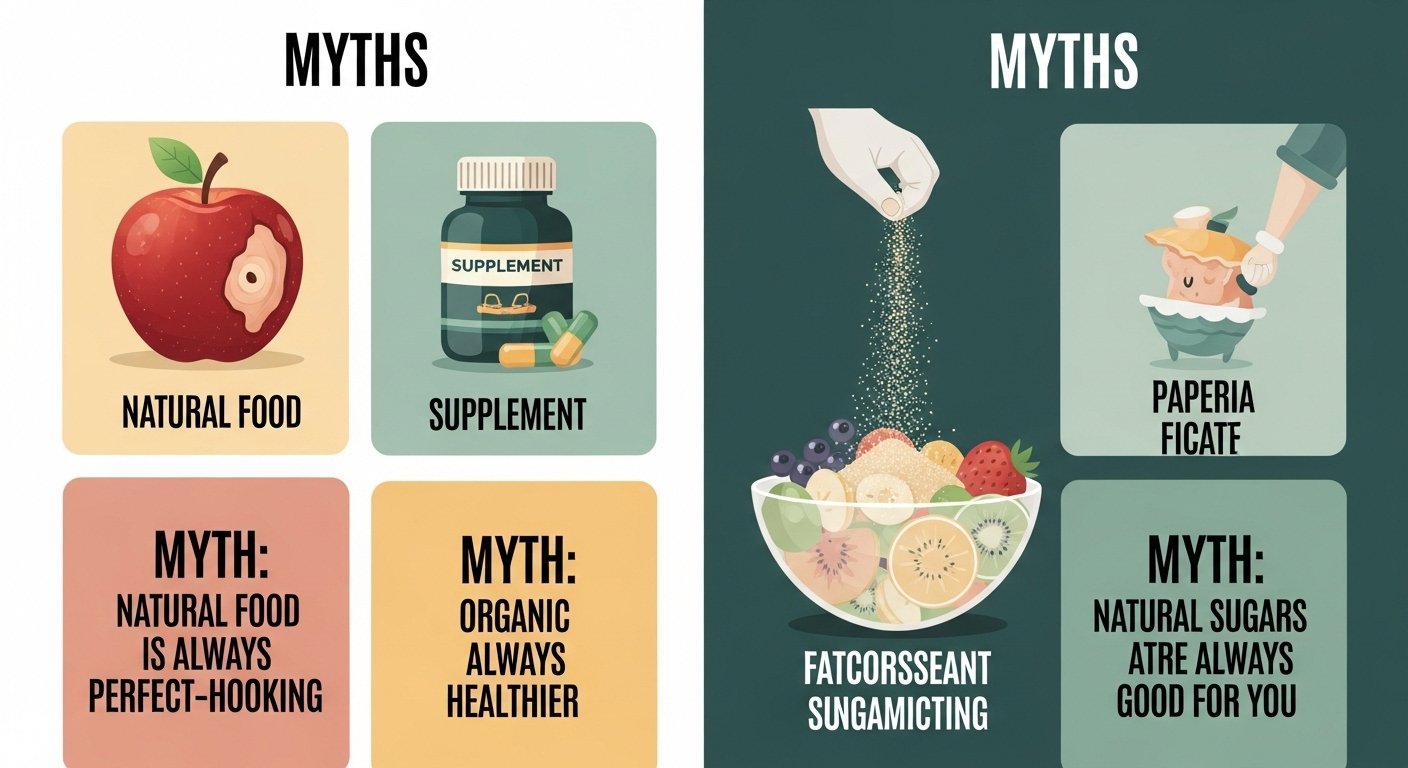
Myth 1: Natural Food Means Organic
Reality: Natural ways can be processed at a minimum without artificial additives, colors or preservatives. The organic diet indicates how the growth is increasing, which means it is produced without synthetic pesticides or fertilizer. Food is natural but not organic and contrast.
Myth 2: All Natural Foods Are Automatically Healthy
Reality: Natural always is not low in calories or sugar. For example, honey and coconut sugar is natural, but they are still high in calories. Moderation is key.
Myth 3: Natural Food Lasts Forever Without Preservatives
Reality:Natural foods can spoil faster because there are no artificial preservatives. Proper storage is required in a cold, airtight, dry place to preserve freshness.
Myth 4: Natural Foods Are Always More Expensive
Reality: Local, seasonal natural foods are cheaper than processed or imported goods. The meal plan saves money around seasonal products.
Myth 5: Natural Food Guarantees Weight Loss
Reality: If natural foods are nutritional-dawned, part control matters. Overeating of nuts, dried fruits or natural sweeteners can still lead to weight gain.
Myth 6: If It Says “Natural” on the Label, It’s 100% Pure
Reality: The word "natural" is not always regulated in packaging. Always check the list of ingredients for hidden additives.
Myth 7: Natural Foods Don’t Cause Allergies
Reality: Allergies can also occur with natural foods such as nuts, dairy and gluten. Learn your tenderness and consult a doctor if you don't know.
Overcoming the Transition from Processed Diets to Natural Foods

Why Transition Can Be Difficult
- Processed foods are high in sugar, salt and artificial flavors, which stimulate the cravings.
- Ease and availability make them difficult to avoid them.
- Taste buds and habits prefer processed flavors.
Common Challenges
- Desires for Junk Food: Made as an addictive due to high sugar, fat and salt.
- Time and Convenience: Natural foods often require preparation.
- Budget Concerns: Excessive cost of natural foods.
- Social Pressure: Eating often features processed options.
Strategies to Overcome the Transition
- Start Gradually: Replace a processed snack per day with fruit or nuts.
- Plan and Prep: Create a weekly plan and prepare vegetables/fruit in advance.
- Smart Substitutions: soda → infused water; Chips → roasted nuts.
- Maintain desires: Be hydrated, eat balanced meals.
- Taste natural foods: Use herbs and spices, try healthy.
- Budget-Friendly Choices: Choose local and seasonal products.
- Mindset Shift:Focus on long -term benefits and track progress.
Sample 1-Week Transition Plan
- Day 1: Replace soda with lemon-mint water.
- Day 2: Swap chips for roasted nuts.
- Day 3: Add one extra serving of vegetables at lunch.
- Day 4: Replace sugary dessert with fresh fruit.
- Day 5: Cook one homemade natural meal.
- Day 6: Try a healthy smoothie instead of packaged juice.
- Day 7: Full natural day (no packaged food).
Natural Food for Kids and Elderly

Why Natural Food is Important
Kids: Growth, Immunity and Nutrients Need for Brain Development.
Elderly: It is Necessory to Digest, Nutrient-Damp Foods That Are Easily Digested to Prevent Strength, Bone Health and Chronic Illnesses.
✅ Natural Natural Foods Provide Vitamins, Minerals, Fiber and Antioxidants Without Harmful Additives.
Natural Foods for Kids
- Fruits & Vegetables: Apples, bananas, berries, carrots, sweet potatoes.
- Whole Grains: Oats, brown rice, whole wheat bread.
- Dairy & Alternatives: Milk, unsweetened yogurt, and cheese.
- Protein Sources: Eggs, lentils, beans, and fish./li>
- Healthy Snacks: Energy bars, smoothies, roasted nuts.
- Natural Sweeteners: Honey or dates, but keep it moderate.
Tips: Make meals colorful, steer clear of packaged snacks, and offer small meals more often.
Natural Foods for Elderly
- Soft, High-Fiber Foods: Cooked vegetables, soups, oatmeal.
- Protein-Rich Foods: Lentils, eggs, fish, beans.
- Bone Health Foods: Milk, yogurt, sesame seeds, leafy greens.
- Heart-Healthy Options: Nuts, seeds, olive oil, avocado.
- Hydrating Foods: Herbal teas, coconut water, fresh juices.
- Natural Spices: Turmeric, ginger (anti-inflammatory).
Tips: Focus on soft meals, avoid excess salt & sugar, include probiotics.
Sample Meal Ideas
For Kids
- Breakfast: Oatmeal with banana slices & honey
- Snack: Apple slices with peanut butter
- Lunch: Brown rice with dal & steamed veggies
- Dinner: Veggie soup with whole wheat bread
For Elderly
- Breakfast: Ragi porridge or oatmeal with milk
- Snack: Soaked almonds & dates
- Lunch: Soft khichdi with vegetables
- Dinner: Light vegetable stew with roti
Sustainable Eating Habits with Natural Foods
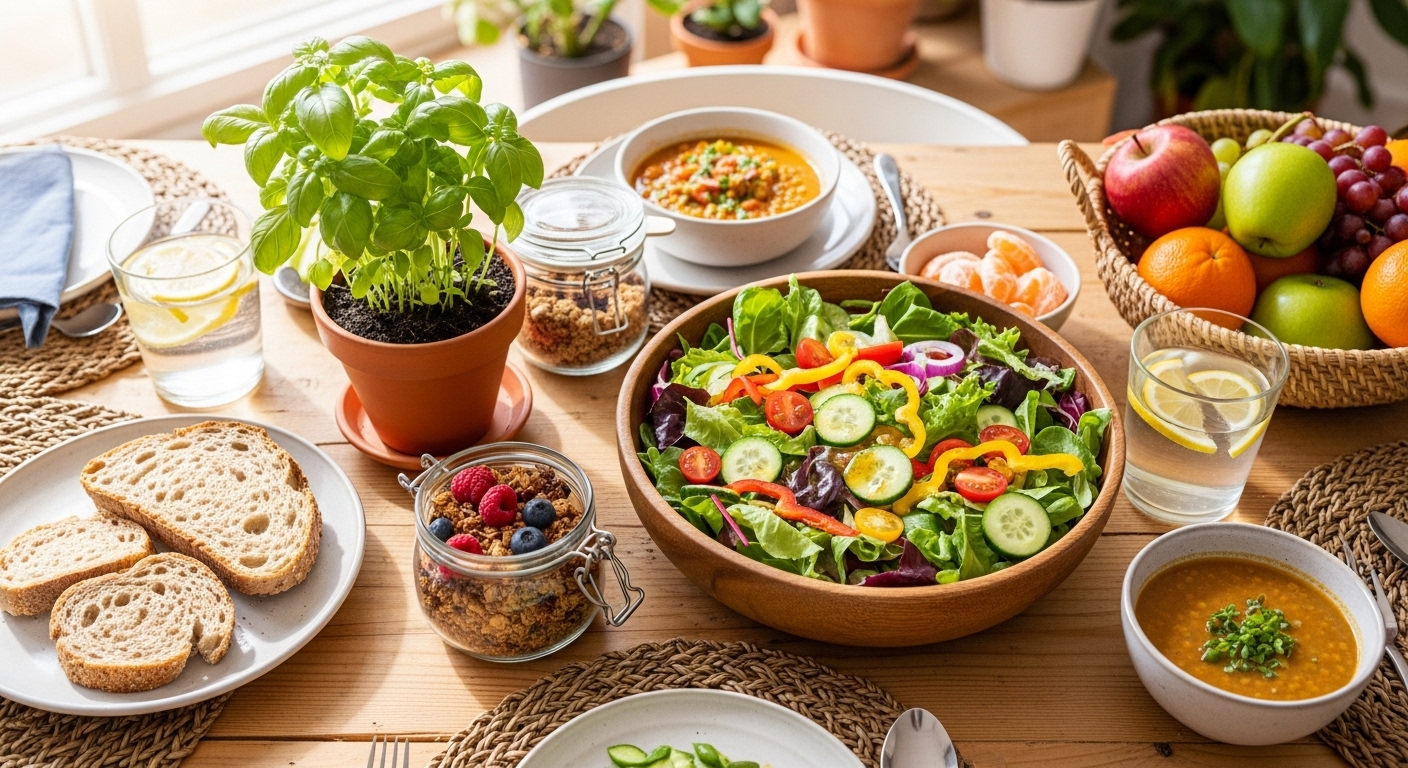
What is Sustainable Eating?
Sustainable eating means choosing foods that benefit your health, protect the environment, and support future generations. It emphasizes natural, nutrient-rich foods and minimizes ecological impact.
Core Principles of Sustainable Eating
- Eat More Plant-Based Foods: Fruits, vegetables, legumes, nuts, whole grains – lower carbon footprint.
- Choose Local & Seasonal Produce: Fresher, nutrient-rich, and eco-friendly.
- Minimize Food Waste: Plan meals, store properly, compost scraps.
- Opt for Whole & Natural Foods: Less processing = less energy use.
- Moderate Meat & Dairy: Include plant-based proteins like lentils and tofu.
- Support Sustainable Farming: Buy from local farmers or fair-trade certified sources.
- Reduce Packaged & Ultra-Processed Foods: Cuts down on plastic and additives.
- Hydrate Sustainably: Use filtered tap water and reusable bottles.
Tips to Make Sustainable Eating Easy
- Plan meals weekly to avoid waste and impulse buys.
- Batch cook for time and energy savings.
- Repurpose leftovers into soups, salads, or wraps.
- Grow your own herbs or vegetables in small spaces.
- Use reusable storage like glass jars and cloth bags.
Sustainable Snack & Meal Ideas
- Snack: Fresh fruit + a handful of local nuts.
- Breakfast: Overnight oats with plant-based milk and seeds.
- Lunch: Quinoa salad with seasonal veggies and olive oil dressing.
- Dinner: Lentil soup with whole-grain bread and sautéed greens.




















